Disclosure: This page may contain affiliate links, meaning we receive a commission if you decide to make a purchase through our links, but this is at no additional cost to you. Please read our disclosure and privacy statement for more info.
So you’ve got a night shift quickly approaching and you’re wondering how long you should sleep to make sure you’re feeling alive and ready for the shift ahead? The good news is, you’ll find the answer here, plus a few extra insider secrets that have saved my butt when working into the night shift.
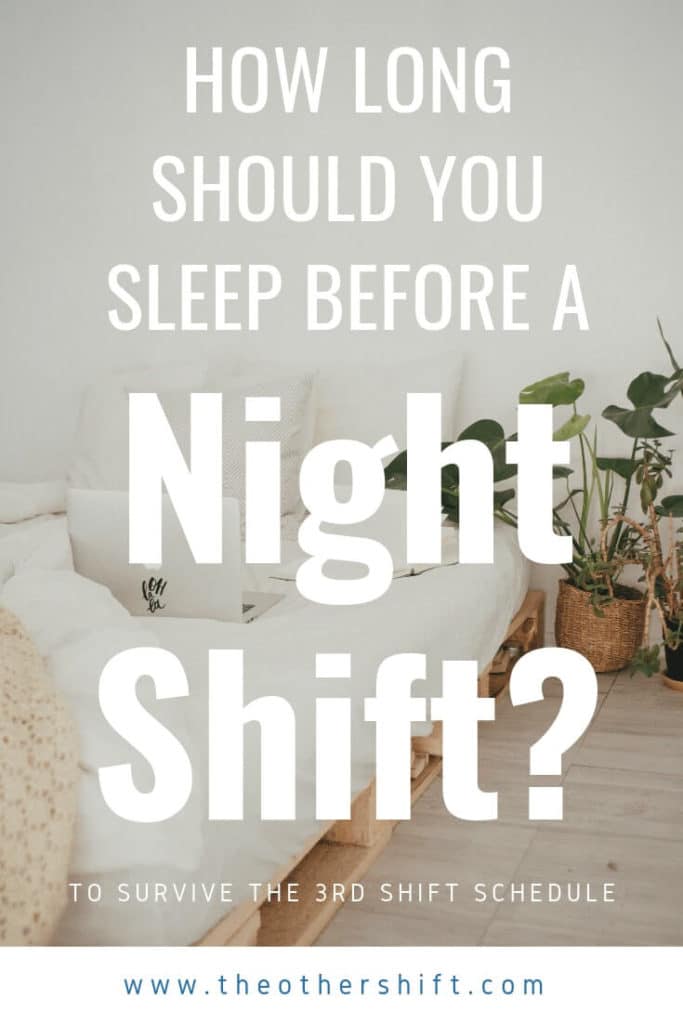
How long should you sleep before a night shift? The answer here is situational. If transitioning from a day schedule, you could prepare yourself by mimicking the night shift schedule in the lead-up. Another option is to do an all-nighter before your shift and sleep the following day. Or stick to a traditional sleep schedule and nap for 2-3 hours before shift one.
As you can see, knowing how long to sleep before working a night shift depends on the volume of sleep you are coming from.
Read on to discover specifically how long you need to sleep for depending on where you’re currently at. We also explore a few epic sleeping tricks to snooze during the day.
How Much Sleep Do You Personally Need Before Night Shift?
As we explained in the introduction, we need to dive a little deeper to discover how much sleep YOU personally need depending on your current schedule.
Let’s explore a few different scenarios to see where you fit in.
Scenario 1: Transitioning From a Day Shift Into a Night Shift
How much sleep do you need?
The more sleep you get the better off you’ll be. I have done everything from staying up the previous night watching movies and keeping myself occupied in order to sleep the whole next day… to not sleeping at all.
And I can tell you, the second option – is no longer an option.
Most would suggest that getting anywhere from 3 hours sleep to 20 minutes before a shift will give you enough of a boost to remain productive and not get in a bad mood.
BUT of course, we are not all the same.
Some need more than 3+ hours while others are okay with a 15-minute power nap, often fuelled with coffee. (This is called a “coffee nap” and is worth checking out in a previous post we wrote here .)
.)
When I am transitioning from days to nights, I like to wake up at about 10 am, hit the gym, come home and then clean the house like a crazy person, eat a late lunch, shower then sleep for 2-3 hours.
The night owls whom I worked with often struggled with the afternoon nap aspect of my plan, but tried relaxing tea’s, lavender, sleep music (which we discuss here in more details with heaps of videos) and sleep aids to squeeze in a 15-20 minute snooze. We go into this in more detail later on.
in more details with heaps of videos) and sleep aids to squeeze in a 15-20 minute snooze. We go into this in more detail later on.
Whilst we are on the topic of naps, do you think they count as sleep? We dive into this question here. An interesting read for us shift workers for sure!

Scenario 2: Currently on Night Shift
You’re currently on night shift already and you’re wondering how much sleep you need during the day to survive the graveyard schedule.
How much sleep do you need?
7-9 hours is what is recommended by the Sleep Foundation in order to stay healthy and prevent disease.
This may seem like a lot during the day when the sun is shining and the rest of the world is alive doing their thing. But there is no silver bullet, unfortunately.
Some night shift workers say they only need 5 hours to function and others say they need 9+ hours. Find what works for you and put in a sleep routine to make it happen consistently.
Good to know…
When sleeping for 30 minutes or longer you will enter a deeper stage of sleep. The great thing here is you’ll reduce the sleep debt, BUT it can take around an hour to shake the sleepy feeling and regain alertness.
Scenario 3: Swing Shift into Night Shift
You currently work the afternoon swing shift and need to transition into the night shift. However, you don’t normally get to bed until 1-2.30am.
How much sleep do you need?
This is a little more unusual however the same priorities for sleep still apply. Getting to sleep as soon as possible after finishing your shift then sleeping until 10ish the following day would work.
Personally, I would then hit the gym or take a long walk outside, come home and do some house cleaning (because it will be at the bottom of your priority list later on), shower, eat and have a sleep for 15 minutes – 3 hours late afternoon.
Whatever you think your body needs at the time to function, it’s best to do that. Growing up my dad always used to say, “listen to your body” … and it’s only now that advice is kicking in.
Related post: The Swing Shift: What Is It and How Do You Cope?
Why Do You Need to Sleep Before Working a Night Shift?
Let’s start with a seemingly obvious question in “why you even need to sleep before nights?”
I’m sure you did an “all-nighter” with your friends back in college and you were fffiiinnneeee… (with a few alcoholic beverages in between).
But I guess the difference is now, we are a little older and unfortunately, don’t have the alcohol so we have to do things a little differently and more adult like. Wow, that just made me feel really old!
Here is why we need sleep:
Poor Sleep Can Make You Fat
What!? Yeah, I know…
Research suggests it’s something to with our hormones and motivational factors to actually want to exercise when feeling tired.
Also, people who are sleep deprived tend to have the munchies. It’s been concluded that those people who are tired tend to eat more calories then those feeling energetic and well-rested.
They say us night shift workers are already at risk of diabetes and obesity. So this should be a pretty good reason why making sleep a priority while on nights beats a short nap or nothing at all.
Related: Is Night Shift Bad for You? 11 Truths Uncovered
Did You Know?
“People with short sleep duration tend to weigh significantly more than those who get adequate sleep.” Source – (1), (2)
Poor Sleepers Get Sick More Easily
How much sick leave do you have left? I’m guessing you don’t want to waste it on sickness and illness which is totally preventable, right?
Lack of sleep has been linked to not only getting the common cold and flu but also big stuff like heart disease.
To explain this better I just need to get a tiny bit medical, but it’s only for a second.
When we sleep our immune system, the friends protecting us from getting sick, release proteins called cytokines.
Some of these cytokines help sleep, which is awesome, but others help to treat infection, inflammation and stress. This issue is these guys need to increase their numbers to overcome the big bully (the infection) in order to win and stop you getting sick… but this only happens when we sleep.
So… cut your sleep short and we lose the fight causing us to not only get sick really easily but it takes ages to recover.
[VIDEO] – This is an informative cartoon description of what is happening in the brain when we sleep. It’s pretty clever and worth a watch.
Sleep Helps You Concentrate
I don’t know about you, but when the clock ticks over 4.30am I really start to feel it. Both physically and mentally, even if I slept well when preparing for the shift.
Sleep can improve our ability to concentrate and critically think through the task at hand which allows for better productivity and performance.
Don’t make it harder for yourself to do these things on night shift. We are already working against our body clocks and are at risk of scary things like insomnia and Shift Work Sleep Disorder.
*Just as a side note, we did a deep dive into these things here in a recent blog post and it’s worth checking out to stay ahead of your health.
in a recent blog post and it’s worth checking out to stay ahead of your health.
Sleep Can Boost Our Performance at the Gym
Do you struggle to find the motivation and energy to exercise after or before night shift? You’re not alone.
According to The American Journal of Managed Care, “The review of 28 studies found that night shift workers were at particularly high risk of developing the type of abdominal obesity associated with heart disease.”
However, simply by getting more restful sleep has proven to boost performance when working out.
We recently published a post detailing the best time to workout when on the night shift. The results were surprising even to me after doing nights for 10+ years. Check out the post here.
Day Sleep Tips When Working Night Shift
Here are 5 unique tricks to best sleep during the day. (These are the tips which have saved my butt…)
1. Turn Your House Into a Darkened Cave and Wear Special Glasses
Have you heard of blue light before? If you haven’t it’s worth checking out our post here which explains it at a beginners level so it makes sense.
which explains it at a beginners level so it makes sense.
But basically, it’s the visible light coming from not only the sun but also the artificial stuff in your phones, lights, TV and even the fridge.
Your sleep hormones love the darkness when preparing for bed, but this blue light tells them you are not ready for sleeping yet, despite how tired you may be. It’s powerful ya’ll and your brain doesn’t like it when you’re trying to sleep.
To overcome this you can either walk around your home in total darkness or if you have blackout blinds, they are pulled. This might not be very practical if you live with others, so you could simply wear blue light blocking glasses.
We wear them and are a little obsessed, to say the least. I did a video review on our favorite pair that you can check out below.
2. Workout Before You Sleep
Workout before you sleep, what!? Are you crazy?
One of the ways to ensure you are falling to sleep quickly is to exercise at some point during the day. I personally notice a huge difference in my sleep from when I exercise to if I’m being lazy and skip a workout.
Most night shift workers I have shared shifts with along with those mentioned in respected medical studies, struggle to fit in a workout at all and therefore spend more time staring at the ceiling over catching zzz’s.
So why not squeeze in a workout before you sleep after working a night shift, should you not have time in the afternoon?
It may seem absurd for those new to the idea, but it can do wonders for your sleep later on. Check out the entire post we did about this topic here.
3. Enjoy Breakfast Without Caffeine or Alcohol
Sorry to ruin the party but cigarettes and alcohol may seem like a calming thing to consume before bed, but it will play havoc later on.
Constant bathroom interruptions are just the beginning! Read more about the other issues in a previous post we wrote about enjoying a beer after night shift here.
What to eat?
Stick to a meal smaller than a pot roast, but bigger than half a slice of toast.
You don’t want to overwhelm your digestive system (as this slows down as we sleep) but we don’t want to wake up with hunger pains either.
This is not very original but stay away from the coffee too if it keeps you wired and makes you pee. Instead, stick to the drinks we chat about in this post here . Chamomile tea is a godsend for me!
. Chamomile tea is a godsend for me!
Here are a few posts we also wrote which are worth exploring in the food department:
- 15 Best Foods For Weight Loss On Night Shift
- 6 Quick And Healthy Night Shift Breakfast Meal Ideas
- How To Use Green Juice To Abolish Night Shift Problems
- 10 Healthy Snacks For Night Shift Workers You’ll Want Next Graveyard Shift
4. Leave Heavy Conversations Until You’ve Slept
Does your housemate want to talk about how to divide the bills or does your wife want to discuss your daughter’s attitude and ways to fix it?
These kinds of conversations are super important, but they can wait 8 hours. This method will not only allow you to wind down more easily, but it’s also great for the other person as your attitude will be better and more open to different suggestions.
Improved Mental State
Studies show people who are sleep deprived report increases in negative moods (anger, frustration, irritability, sadness) and decreases in positive moods. Source (3)
Related posts: Night Shift Is Ruining My Marriage. How to Stop It Happening
5. Make Sure the Bedroom Feels Like a 5-Star Hotel
Is your bedroom a place you cannot wait to be in? Are you just busting to get into bed because you love your pillow sheets and mattress SO much?
Or, do you actually get annoyed by the pillow, the blinds, the creaking door and clicking of the fan?
If so, make some changes.
You have enough on your plate as a night shift worker that creating a special, stress-free place is a non-negotiable if you want to sleep.
Here are the things to consider with links to other posts we have done exploring this in more detail.
- Sleep aids
 (blackout blinds, fans, earplugs, white noise machine)
(blackout blinds, fans, earplugs, white noise machine) - Drink gold juice
- Get sheets that make you feel like you’re sleeping on clouds. Nolah Mattress Protectors and Sheets is just what you need!
- Set the temperature right
- Upgrade your mattress. Now I know this is an expensive exercise but making the investment could make all the difference. We recommend taking a look at the Nolah Signature 12 Mattress – it’s pretty great.
- Make sure you have an eye mask
 ready for when the sun starts creeping in.
ready for when the sun starts creeping in.
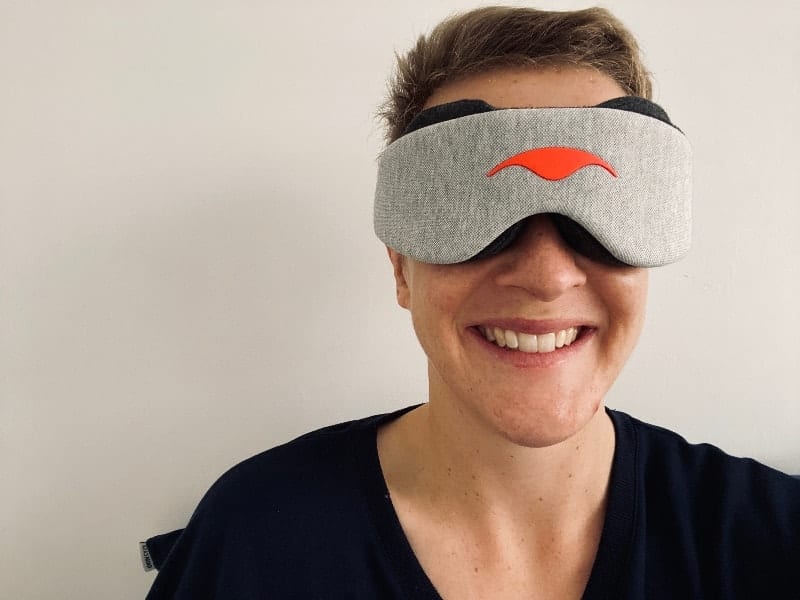
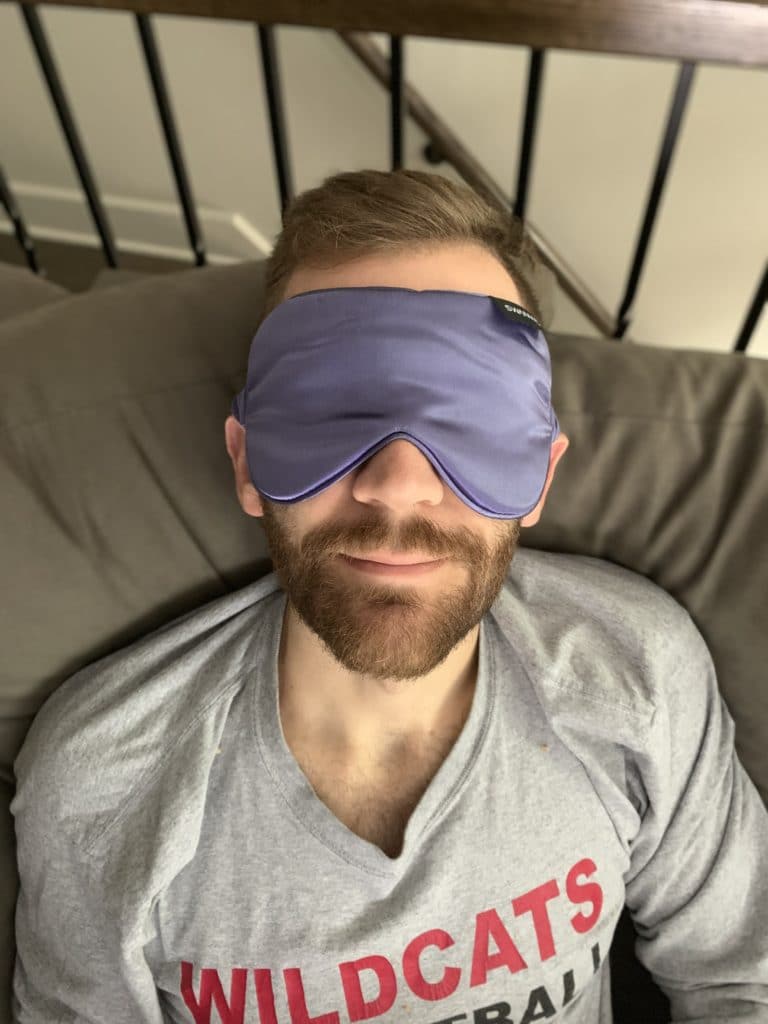
FUN FACT
Buying a new bed can cause “a significant decrease in stress,” possibly due less pain from sleeping on a better-suited mattress and an improvement in sleep quality. Source: (4), (5)
Summary: How Long Should You Sleep Before A Night Shift?
As you can see it totally depends on your situation at the time and where you find yourself within the night shift journey.
But one thing is for sure. Sleep must be a priority and we should always be aiming for 7-9 hours sleep so we don’t get sick.
Before you go, have you considered tracking your sleep? This post explores the very best sleep trackers on the market.
Happy Snoozing!

Disclosure: This page may contain affiliate links, meaning we receive a commission if you decide to make a purchase through our links, but this is at no additional cost to you. Please read our disclosure and privacy statement for more info.

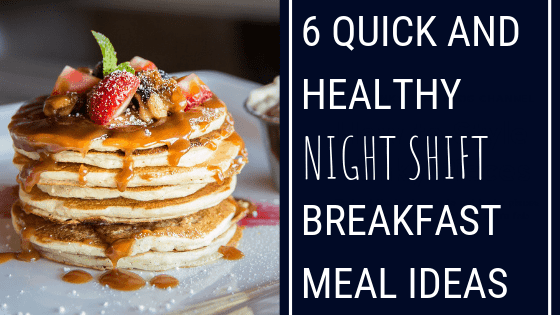
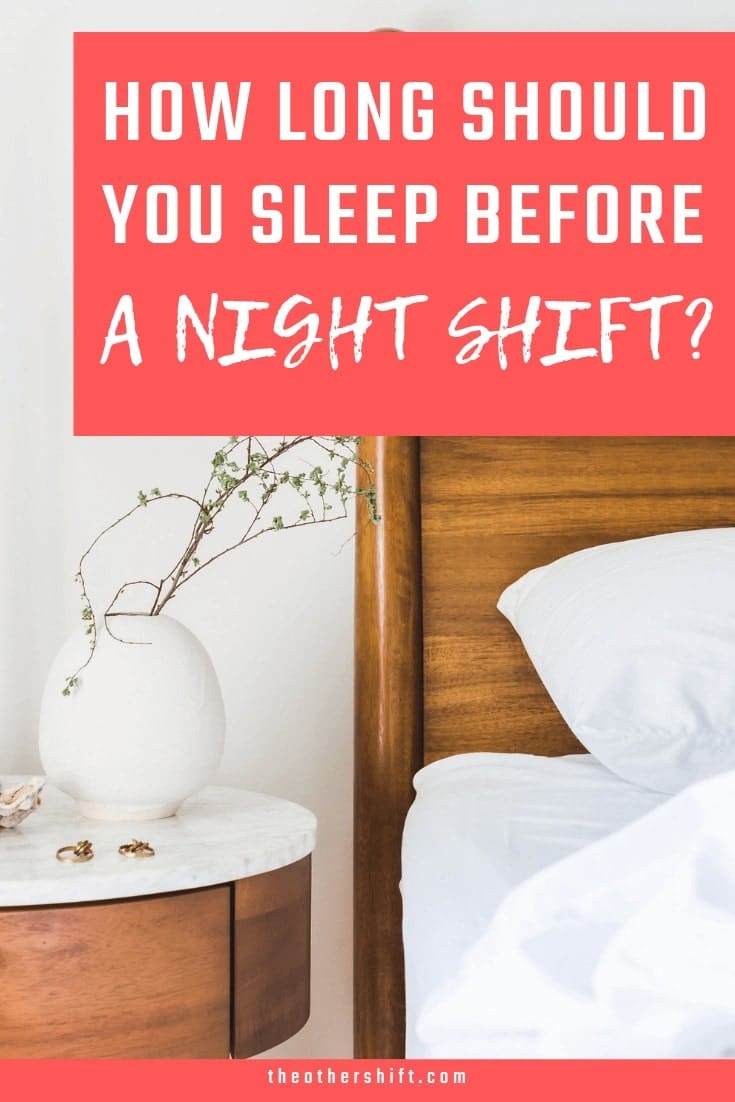
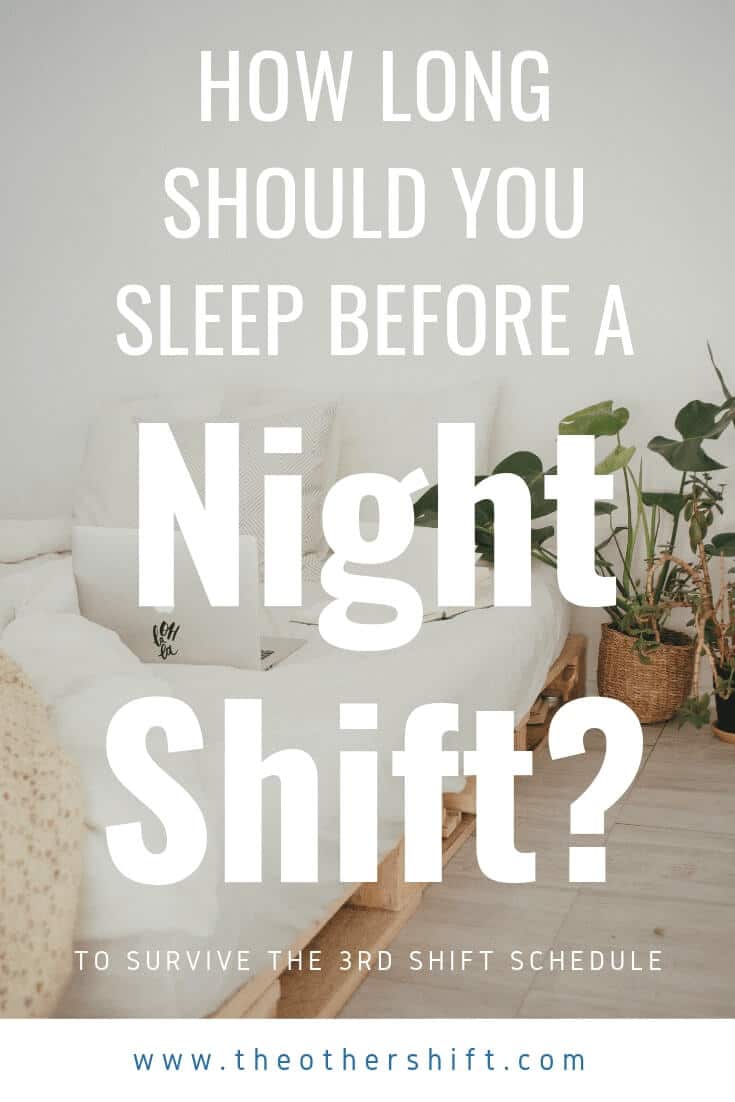
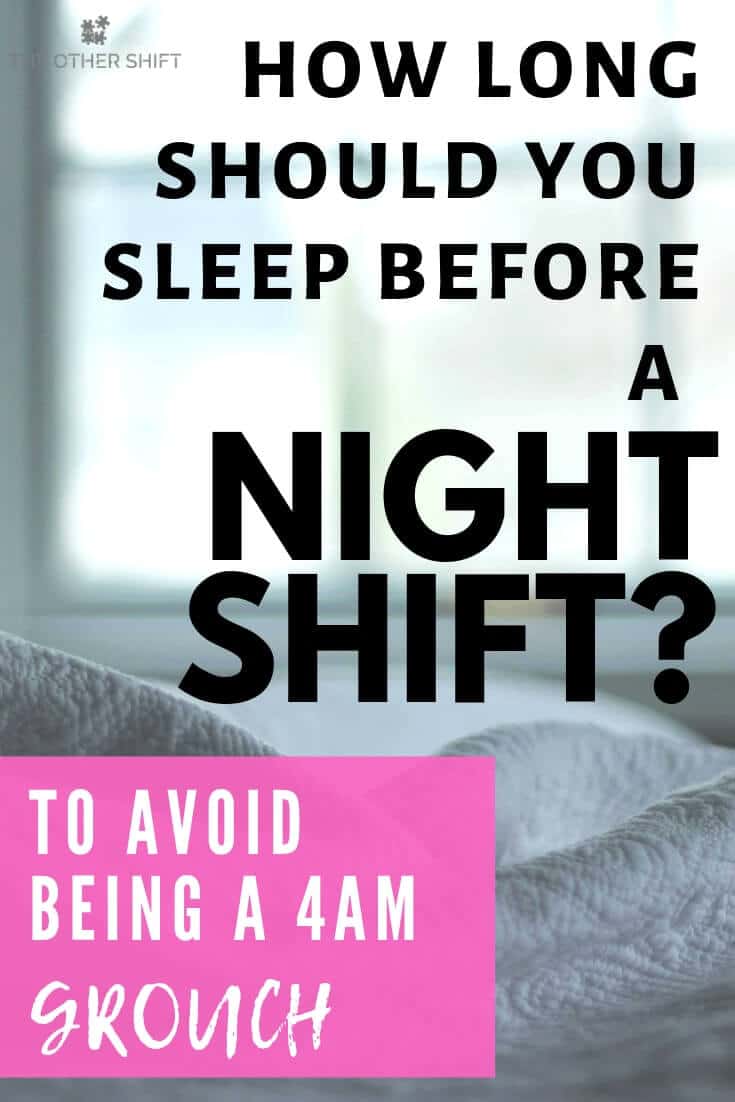
Hi Emma,
I just wanted to say that this page has been a GODSEND for me as I prepare to begin my journey through keto, while working at Amazon! it’s a very demanding job, and I burn a lot of calories while working, and when I’m home I struggle to get the proper amount of sleep. this particular article has given me great tips on how to fix that issue and I thank you!
-Thomas C.
Hi Thomas,
Well, you have made my day! Thank you very much for your kind words. It sounds like you’re a busy man. Best of luck with your keto/Amazon adventure. I wanted to link a few more posts which may be of interest to you, sleep music , eye masks and weird sleep tips. If you have any further issues please get in contact with us as we would be honored to help out. Cheers, Emma